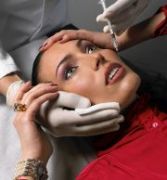Botox Injection Associated with Significant, Sustained Improvement in Symptoms of Major Depressive Disorder
By paralyzing the facial muscles involved in producing frown lines, onabotulinumtoxinA injection seems to alleviate depression, especially among patients who exhibit a high degree of hyperactivity.

By paralyzing the facial muscles involved in producing frown lines, the cosmetic drug Botox (onabotulinumtoxinA) seems to alleviate depression, especially among patients who exhibit a high degree of hyperactivity, according to a recent study.
Tillmann Kruger, MD, an associate professor in the Department of Psychiatry, Social Psychiatry and Psychotherapy at the Hannover Medical School in Hannover, Germany, and Axel Wollmer, MD, a psychiatrist and psychotherapist specializing in geriatric psychiatry who is also head of the Department of Old Age Psychiatry at the Asklepios Clinic North in Hamburg, Germany, presented these findings on Sunday, May 4, at the 2014 annual meeting of the American Psychiatric Association in New York City, NY.
Using Botox in this way might seem at first more like treating a symptom of depression rather than the cause. However, Wollmer explained, “Emotions are expressed by facial muscles, which in turn send feedback signals to the brain to reinforce those emotions.” Because Botox is known to target the same glabellar region in the forehead that produces frowns, “by treating the facial muscles with Botox, we can interrupt this cycle,” said Wollmer.
In this randomized, placebo-controlled study, 15 subjects with major depressive disorder who had been resistant to other forms of therapy were each given a single injection of Botox. That drug’s effect on facial muscles is known to persevere for three to six months, and this study lasted 16 weeks, Kruger explained.
Within six weeks, depressive symptoms had been reduced by 47.1% among the Botox-injected cohort, based on HAM-D measurements, versus a 9.2% reduction among those who received placebo. The researchers further reported that by the end of the study, 86.7% of those injected with Botox experienced at least a partial response, while only 26.7% of the control group did, and 33.3% of the Botox recipients were in remission, compared with 13.3% of the others.
“Those who have indications of dynamic hyperactivity seem to respond better,” Wollmer explained in an interview after the formal presentation. That might include people who play with their hands, pull their hair, and bite their nails, as well as people who exhibit highly active facial expressions, he said.
The most common adverse reaction experienced by patients in the study was headache. Approximately a half-dozen participants experienced mild to severe headaches, which lasted only “a few days,” the scientists said, and the difference between headache rates experienced by the placebo group was not statistically significant.
In fact, Wollmer noted that the injection may well have cured rather than caused the headaches, since Botox has been approved by the Food and Drug Administration to treat chronic migraines.
The researchers are now conducting a meta-analysis of their study and two other studies, conducted this year, that seem to confirm their findings (Finzi & Rosenthal, and Magid, et al).
If these findings hold up, treating depression and migraine would not be the only serious medical usages for Botox, which has become a symbol of frivolous “lifestyle” drugs. It has also been approved by the FDA for the eye conditions blepharospasm (eyelid spasm), strabismus (misalignment of the eyes when one or both eyes turn inward or outward), and the temporary improvement in the appearance of moderate to severe lateral canthal lines (crow’s feet), as well as severe primary axillary hyperhidrosis (severe underarm perspiration).